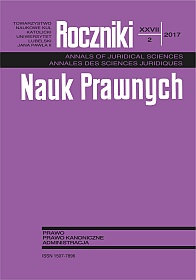Requirements for the Office of Pastor in Contemporary Law of Polish Synods
Abstract
In the provision of the office of the pastor norms of universal law and particular law must be observed. The legislator in can. 521 § 2-3; 522; 527 § 2-3; 538 § 1 refers to regulations being in force in particular Churches.
In the law of Polish synods were clarified requirements for administrative acts of the provision of the office of the pastor. There are pertain to ecclesiastical authority, candidates for the post of pastor, the entrusting of the office and the formalities of these acts. Universal law was manifolded or paraphrased in the most of regulations of synods. However, innovative directives about the diocesan bishop or requirements for candidates for the office of the pastor are set in some of them. Typically it is finishing by these candidates a special formation and passing “the examination for pastors”.
For validity of the provision it is necessary for the office to be vacant. Reasons of loss of office also are defined in the law of synods. Moreover, among causes in broad range submitting resignation by pastors who have completed appropriate age is regulated. Only a few synods writing form of entrusting of the office of the pastor is emphasized.
References
Coccopalmerio Francesco: De paroecia, Roma: Editrice Pontificia Università Gregoriana 1991.
Coccopalmerio Francesco: Il concetto di parrocchia nel CIC 1983, [w:] Parafia w prawie kanonicznym i w prawie polskim, red. S.L. Głódź, J.Krukowski, M. Sitarz, Lublin: Towarzystwo Naukowe KUL 2013, s. 7-37.
DʼOstilio Francesco: Prontuario del Codice di diritto canonico, Città del Vaticano: Libreria Editrice Vaticana 1995.
Góralski Wojciech: Synody partykularne, [w:] Komentarz do Kodeksu Prawa Kanonicznego, t. II/1: Księga II. Lud Boży. Cześć I. Wierni chrześcijanie. Cześć II. Ustrój hierarchiczny Kościoła, red. J. Krukowski, Poznań: Pallottinum 2005, s. 305-314.
Périsset Jean-Claude: La paroisse. Commentaire des Canons 515-572, Paris: Edition Tardy 1989.
Sitarz Mirosław: Organy kolegialne w kościołach partykularnych, [w:] Kościół partykularny w Kodeksie Jana Pawła II, red. J. Krukowski, M. Sitarz, Lublin: Wydawnictwo KUL 2004, s. 115-153.
Sitarz Mirosław: Podstawowe zasady w sprawowaniu władzy ustawodawczej biskupa diecezjalnego, [w:] II Polski Synod Plenarny a synody diecezjalne, red. J. Krukowski, M. Sitarz, A. Pastwa, Lublin: Towarzystwo Naukowe KUL 2015, s. 93-117.
Sitarz Mirosław: Zarządzanie parafią w sytuacjach nadzwyczajnych, [w:] Parafia w prawie kanonicznym i w prawie polskim, red. S.L. Głódź, J.Krukowski, M. Sitarz, Lublin: Towarzystwo Naukowe KUL 2013, s. 133-154.
Sobański Remigiusz: Urzędy kościelne, [w:] Komentarz do Kodeksu Prawa Kanonicznego, t. I: Księga I. Normy ogólne, red. J. Krukowski, Poznań: Pallottinum 2003, s. 235-286.
Sweeny Edward A.: The Obligations and Rights of the Pastor of a Parish. According to the Code of Canon Law, New York: Frathers and Brothers of the Society of St. Paul 2002.
Viana Antonio: El párroco, pastor proprio de la paroquia, Ius Canonicum 29 (1989), s. 467-481.
Wnuk Radosław: Prowizja kanoniczna na urząd proboszcza, Kościół i Prawo 5 (18) 2016, nr 1, s. 95-117.
Copyright (c) 2017 Roczniki Nauk Prawnych

This work is licensed under a Creative Commons Attribution-NonCommercial-NoDerivatives 4.0 International License.


